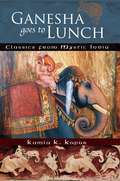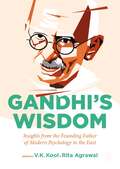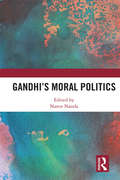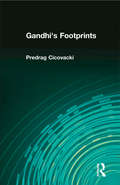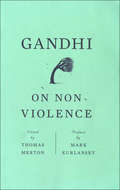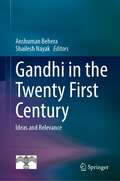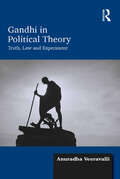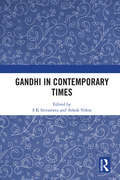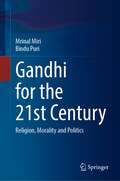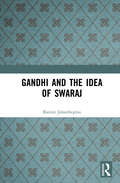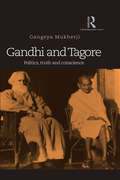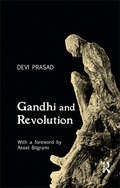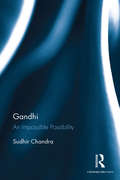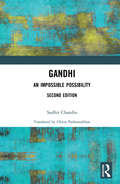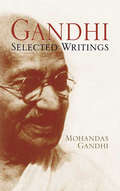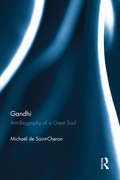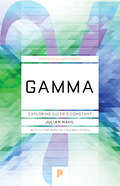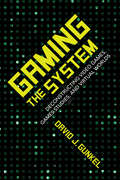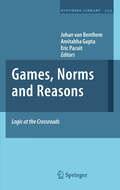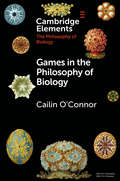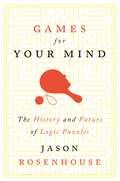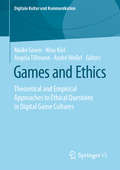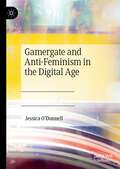- Table View
- List View
Ganesha Goes to Lunch
by Kamla K. KapurThese are tales of ancient India, some are celebrated and well known, others are small, unnoticed gems, not readily known to Western readers. The stories though often short, encapsulate some of life's essential truths. The gods of India in their abodes, humans struggling with life's problems, and gods and humans interacting, all revealing the essential lessons of life. The collection contains adaptations from the Mahabharata, Ramayana, Puranas, and Vedas stories, all illustrate the great spiritual and practical themes of the human condition. Kamla Kapur brings her poet's eye and ear to the retelling of these stories recreating and dramatizing them to illuminate their relevance to modern times.
Gandhi’s Wisdom: Insights from the Founding Father of Modern Psychology in the East
by V. K. Kool Rita AgrawalThis book examines what Gandhian thought contributes to the conceptualisation of wisdom and its application in the 21st Century. It draws together leading international researchers and practitioners to combine an in-depth understanding of Gandhi’s philosophy with the latest research from psychology and allied social sciences. Beginning with an overview of wisdom in the domain of scientific research and as it is understood in our everyday life, the book’s editors further call attention to key cross cultural issues limiting its current scope. Amongst the topics explored are Gandhi’s silence, fasting, vows, self-efficacy, self-control, and more, illustrating what he offers not only to the study of wisdom within psychology, but across a broad range of disciplines and professional enterprises. It is invaluable to students and scholars of Gandhian studies, the psychology of wisdom, management and peace psychology; as well to readers with a general interest in the application of Gandhi’s wisdom today.
Gandhi's Moral Politics
by Naren NandaThis volume explores the scope and limits of Mahatma Gandhi's moral politics and its implications for Indian and other freedom movements. It presents a set of enlightening essays based on lectures delivered in memory of the eminent historian B. R. Nanda along with a new introductory essay. With contributions by leading historians and Gandhi scholars, the book provides new perspectives on the limits of Gandhi’s moral reasoning, his role in the choice of destination by Indian Muslim refugees, his waning influence over political events, and his predicament amid the violence and turmoil in the years immediately preceding partition. The work brings together wide-ranging insights on Gandhi and revisits his religious views, which were the foundation of his morality in politics; his experience of civil disobedience and its nature, deployment and limits; Satyagraha and non-violence; and his struggle for civil rights. The volume also examines how Gandhi’s South African phase contributed to his later ideas on private property and self-sacrifice. This book will be of immense interest to researchers and scholars of modern Indian history, Gandhi studies, political science, peace and conflict studies, South Asian studies; to researchers and scholars of media and journalism; and to the informed general reader.
Gandhi's Footprints
by Predrag CicovackiMahatma K. Gandhi's dedication to finding a path of liberation from an epidemic of violence has been well documented before. The central issue and the novelty of this book is its focus on what Gandhi wanted to liberate us for. The book also provides an assessment of how viable his positive vision of humanity is. Gandhi revolutionized the struggle for Indian liberation from Great Britain by convincing his countrymen that they must turn to nonviolence and that India needed to be liberated from its social ills—poverty, unemployment, opium addiction, institution of child marriage, inequality of women, and Hindu-Muslim frictions—even more than it needed political freedom. Although Gandhi's legacy has not been forgotten, it has often been distorted. He is called "Mahatma" and venerated as a saint, but not followed and often misinterpreted. Predrag Cicovacki attempts to de-mythologize Gandhi and take a closer look at his thoughts, aims, and struggles. He invites us to look at the footprints Gandhi left for us, and follow them as carefully and critically as possible. Cicovacki concludes that Gandhi's spiritual vision of humanity and the importance of adherence to truth (satyagraha)are his lasting legacy.
Gandhi on Non-Violence
by Mark Kurlansky Mahatma Gandhi Thomas MertonAn essential compendium for understanding Gandhi's profound legacy. "One has to speak out and stand up for one's convictions. Inaction at a time of conflagration is inexcusable."--Mahatma Gandhi The basic principles of Gandhi's philosophy of non-violence (Ahimsa) and non-violent action (Satyagraha) were chosen by Thomas Merton for this volume in 1965. In his challenging Introduction, "Gandhi and the One-Eyed Giant," Merton emphasizes the importance of action rather than mere pacifism as a central component of non-violence, and illustrates how the foundations of Gandhi's universal truths are linked to traditional Hindu Dharma, the Greek philosophers, and the teachings of Christ and Thomas Aquinas. Educated as a Westerner in South Africa, it was Gandhi's desire to set aside the caste system as well as his political struggles in India which led him to discover the dynamic power of non-cooperation. But, non-violence for Gandhi "was not simply a political tactic," as Merton observes: "the spirit of non-violence sprang from an inner realization of spiritual unity in himself." Gandhi's politics of spiritual integrity have influenced generations of people around the world, as well as civil rights leaders from Martin Luther King, Jr. and Steve Biko to Václav Havel and Aung San Suu Kyi. Mark Kurlansky has written an insightful preface for this edition that touches upon the history of non-violence and reflects the core of Gandhi's spiritual and ethical doctrine in the context of current global conflicts.
Gandhi in the Twenty First Century: Ideas and Relevance
by Shailesh Nayak Anshuman BeheraThis book engages a multidisciplinary approach to understand Gandhi in addressing specific contemporary societal issues. The issues highlighted in the book through thirteen distinct, yet interrelated, themes offer solutions to the societal challenges through the prism of Gandhian thought process. This edited book explores how ideas Gandhi expressed over a century ago can be applied today to issues from the UN's Sustainable Development Goals to peaceful resolution of conflicts. In particular, it looks at the contemporary societies' critical issues and offers solutions through the prism of Gandhian ideas. Written in an accessible style, this book reintroduces Gandhi to today's audiences in relevant terms.
Gandhi in Political Theory: Truth, Law and Experiment
by Anuradha VeeravalliCan Gandhi be considered a systematic thinker? While the significance of Gandhi’s thought and life to our times is undeniable it is widely assumed that he did not serve any discipline and cannot be considered a systematic thinker. Despite an overwhelming body of scholarship and literature on his life and thought the presuppositions of Gandhi’s experiments, the systematic nature of his intervention in modern political theory and his method have not previously received sustained attention. Addressing this lacuna, the book contends that Gandhi’s critique of modern civilization, the presuppositions of post-Enlightenment political theory and their epistemological and metaphysical foundations is both comprehensive and systematic. Gandhi’s experiments with truth in the political arena during the Indian Independence movement are studied from the point of view of his conscious engagement with method and theory rather than merely as a personal creed, spiritual position or moral commitment. The author shows how Gandhi’s experiments are illustrative of his theoretical position, and how they form the basis of his opposition to the foundations of modern western political theory and the presuppositions of the modern nation state besides envisioning the foundations of an alternative modernity for India, and by its example, for the world.
Gandhi In Contemporary Times
by S K Srivastava Ashok VohraThis volume brings together essays which discuss and contextualise Gandhi’s ideas on pluralism, religious identity, non-violence, satyagraha, and modernity. It interrogates the epistemic foundations of Gandhian thinking and weltanschauung, identifies diverse strands within his arguments, and gives it new meaning in contemporary society. This book focuses on Gandhi’s engagements with religious, political and social conflicts, his reflections on faith and modernity, and his argumentative dialogues with Mohammad Ali Jinnah and B R Ambedkar. It provides critical insights into Gandhi’s philosophy and suggests ways of engaging with his ethical and moral ideas in contemporary intellectual and political discourse. Comparing and contrasting Gandhian thought and strategies with contemporary issues and conceptions of religious freedom, conflict resolution, and liberalism; the volume reformulates and reconstitutes his intellectual and political legacy. This book points to new and possible future directions of research on Gandhian concepts and will be useful for scholars in the fields of political science, Gandhian studies, sociology and philosophy.
Gandhi for the 21st Century: Religion, Morality and Politics
by Mrinal Miri Bindu PuriThis book examines the centrality of ideas such as satya (truth), ahimsa (non-violence), humility, and respect for understanding moral life in the complex milieu of human existence. It provides a comprehensive view of how Gandhian ideas have both a temporal and spatial universality significantly different from Western modern philosophy's universality claims. The chapters represent different styles of philosophy but with a common purpose, offering insights into how the global debates on religion, morality, and politics are assessed from Gandhi's point of view. Written in language accessible to general readers with an interest in Gandhian thinking, the book will appeal to academics and philosophers.
Gandhi and the Idea of Swaraj
by Ramin JahanbeglooThis book examines Gandhi's idea of swaraj as an alternative to the modern concept of political authority. It also introduces the readers to Gandhi’s ideas of moral interconnectedness and empathetic pluralism. It explores the Gandhian belief that "nonviolence" as a moral and political concept is essentially the empowerment of the Other through spiritual and political realization of the self as a non-egocentric subject. Further, it highlights swaraj as an act of conscience and therefore a transformative force, essential to the harmony between spirituality and politics. The volume will be of great interest to scholars and researchers of philosophy, politics, and South Asian studies.
Gandhi and Tagore: Politics, truth and conscience
by Gangeya MukherjiThis book brings together the political thought of Gandhi and Tagore to examine the relationship between politics, truth and conscience. It explores truth and conscience as viable public virtues with regard to two exemplars of ethical politics, addressing in turn the concerns of an evolving modern Indian political community. <P><P>The comprehensive and textually argued discussion frames the subject of the validity of ethical politics in inhospitable contexts such as the fanatically despotic state and energised nationalism. The book studies in nuanced detail Tagore’s opposition to political violence in colonial Bengal, the scope of non-violence and satyagraha as recommended by Gandhi to Jews in Nazi Germany, his response to the complexity of protest against the Jallianwala Bagh massacre, and the differently constituted nationalism of Gandhi and Tagore. It presents their famous debate in a new light, embedded within the dynamics of cultural identification, political praxis and the capacity of a community to imbibe the principles of ethical politics. Comprehensive and perceptive in analysis, this book will be a valuable addition for scholars and researchers of political science with specialisation in Indian political thought, philosophy and history. <P><P>Gangeya Mukherji is Reader in English at Mahamati Prannath Mahavidyalaya, Mau-Chitrakoot, Uttar Pradesh, India.
Gandhi and Revolution
by Devi PrasadThis volume is a collection of Devi Prasad’s essays on Gandhi, social justice and social change. The different essays address themes ranging from Gandhi’s ideals of satyagraha and ahimsa, civil disobedience and non-violence, to the Gandhian approach to education as founded in making and crafting as well as participation in the political and social movements of our times. They also engage the revolutionary potential of Gandhi’s thought, drawing parallels between Lenin and Gandhi and analysing the historical significance of Gandhi’s anti-imperialist yet non-violent political philosophy. In sum, the volume dwells on the continuing, critical relevance of Gandhi in our times. It will be of interest to those in education, political science, peace and conflict studies, history and philosophy, as well as to the general reader interested in Gandhian thought.
Gandhi: An Impossible Possibility
by Sudhir ChandraFor a man who made such a powerful intervention in the history of the 20th century, many of Mahatma Gandhi’s ideas were misunderstood or obfuscated during his lifetime. This book draws our attention to Gandhi’s last years, particularly the marked change in his understanding of the acceptance of non-violence by Indians. It points to a startling discovery Gandhi made in the years preceding India’s Independence and Partition: the struggle for freedom which he had all along believed to be non-violent was in fact not so. He realised that there was a causal relationship between the path of illusory ahimsa which had held sway during the freedom struggle and the violence that erupted thereafter during Partition. Calling for a serious rethink on the very nature and foundation of modern India, this book throws new light on Gandhian philosophy and its far-reaching implications for the world today. It will interest not only scholars and researchers of modern Indian history, politics, and philosophy but also lay readers.
Gandhi: An Impossible Possibility
by Sudhir ChandraGandhi was perhaps the most influential yet misunderstood figure of the twentieth century. Drawing close attention to his last years, this book explores the marked change in his understanding of the acceptance of non-violence by Indians. It points to a startling discovery Gandhi made in the years preceding India’s Independence and Partition: the struggle for freedom which he had all along believed to be non-violent was in fact not so. He realised that there was a causal relationship between the path of illusory ahimsa, which had held sway during the freedom struggle, and the violence that erupted thereafter during Partition. In the second edition of this much-acclaimed volume, Chandra revisits Gandhi’s philosophy to explain how and why the phenomenon of the Mahatma has been understood and misunderstood through the years. Calling for a rethink of the very nature and foundation of modern India, this book throws new light on Gandhian philosophy and its far-reaching implications for the world today. It will interest not only scholars and researchers of modern Indian history, politics and philosophy, but also lay readers.
Gandhi: Selected Writings
by Mohandas Gandhi Alastair DuncanIndia's political and spiritual leader, Mahatma ("Great Soul") Gandhi led his country's struggle for independence from Britain through a campaign based on nonviolence and civil disobedience. Gandhi's doctrine of nonviolent action profoundly influenced civil rights leaders around the world, including Martin Luther King, Jr., and Nelson Mandela. This anthology of the Mahatma's writings offers a revealing look at his life and philosophy.Editor Ronald Duncan provides a lengthy introduction in which he recounts his personal association with Gandhi. "In making this selection," he notes, "I have tried to bear three things in mind: firstly, my intention to present material of permanent interest as opposed to comments on day-to-day political matters; also to show the development and to give the essence of Mahatma Gandhi's philosophy of Satyagraha [defense of and by the truth], and its basis in the religious teachings of the Gita; and thirdly, I have tried to emphasize those ideas which, though they may not seem immediately applicable to Western life, should be of considerable relevance to contemporary thought."In addition to substantial extracts from Gandhi's writings, this collection features his speeches — including some made during his trials — and extracts from his diary. The book concludes with a selection of Gandhi's correspondence with Lord Linlithgow, then Viceroy of India, and their reflections on the country's future.
Gandhi: 'Hind Swaraj' and Other Writings
by Anthony J. ParelHind Swaraj is Mahatma Gandhi's fundamental work. Not only is it key to understanding his life and thoughts, but also the politics of South Asia in the first half of the twentieth century. Celebrating 100 years since Hind Swaraj was first published in a newspaper, this centenary edition includes a new preface and editor's introduction, as well as a new chapter on 'Gandhi and the 'Canonical aims of life''. The volume presents a critical edition of the 1910 text of Hind Swaraj, fully annotated and including Gandhi's own Preface and Foreword (not found in other editions). Anthony J. Parel sets the work in its historical and political contexts and analyses the significance of Gandhi's experiences in England and South Africa. The second part of the volume contains some of Gandhi's other writings, including his correspondence with Tolstoy and Nehru.
Gandhi: Anti-Biography of a Great Soul
by Michaël de Saint-CheronThis book is not just another biography of Gandhi. It is valuable because it offers us a French view--- and Jewish too perhaps---- of a man and times so familiar to us and yet which acquires another dimension as it is represented through another culture. There are eloquent accounts in this book of philosophers like Ramakrishna and Vivekananda who influenced Gandhi’s thought and life. Rather than political events, Michaël de Saint-Chéron holds up the force and courage of a man who became a prophet in a blood-thirsty century. Interestingly, the author points out that it is only India and the Middle East which has given the world the two mother religions of Hinduism and Judaism. Neither China nor Europe, two major cultures, have produced a world religion. The book is further enriched by a discussion on Hindu mysticism and the concept of ‘love’ in Judaism. The author also looks at how Gandhi has played a major role on shaping French intellectuals such as Andre Malraux. At the end however, a central dilemma, and a painful one to the work, concerns Gandhi’s silence on the Holocaust. This book will be of interest to scholars working on Gandhian studies, Indian philosophy and Judaism, and to readers of politics, ethics and history.
GANAS DE VIVIR (EBOOK)
by Alejandro RozitchnerAlejandro Rozitchner es un intelectual de nuestro tiempo, conocido por su estilo provocador y por su concepción afirmativa de la realidad. Como pensador desarrolló una visión del mundo en la que se conjugan la filosofía existencialista, la psicoterapia y una gran influencia de Nietzsche. Ganas de vivir propone una posición vital positiva e inteligente, es una guía que influenciará con seguridad a sus lectores dándoles fuerza y ayudándolos a desplegar su mundo personal. Un texto cargado de perspectivas para fortalecer el desarrollo propio y ajeno, un libro amistoso que busca meterse en la vida concreta para producir orientación y favorecer el autoconocimiento.
Gamma: Exploring Euler's Constant (Princeton Science Library #53)
by Julian HavilAmong the many constants that appear in mathematics, π, e, and i are the most familiar. Following closely behind is y, or gamma, a constant that arises in many mathematical areas yet maintains a profound sense of mystery. In a tantalizing blend of history and mathematics, Julian Havil takes the reader on a journey through logarithms and the harmonic series, the two defining elements of gamma, toward the first account of gamma's place in mathematics. Introduced by the Swiss mathematician Leonhard Euler (1707-1783), who figures prominently in this book, gamma is defined as the limit of the sum of 1 + 1/2 + 1/3 + . . . Up to 1/n, minus the natural logarithm of n--the numerical value being 0.5772156. . . . But unlike its more celebrated colleagues π and e, the exact nature of gamma remains a mystery--we don't even know if gamma can be expressed as a fraction. Among the numerous topics that arise during this historical odyssey into fundamental mathematical ideas are the Prime Number Theorem and the most important open problem in mathematics today--the Riemann Hypothesis (though no proof of either is offered!). Sure to be popular with not only students and instructors but all math aficionados, Gamma takes us through countries, centuries, lives, and works, unfolding along the way the stories of some remarkable mathematics from some remarkable mathematicians.
Gaming the System: Deconstructing Video Games, Games Studies, and Virtual Worlds (Digital Game Studies)
by David J. GunkelGaming the System takes philosophical traditions out of the ivory tower and into the virtual worlds of video games. In this book, author David J. Gunkel explores how philosophical traditions—put forth by noted thinkers such as Plato, Descartes, Kant, Heidegger, and Žižek—can help us explore and conceptualize recent developments in video games, game studies, and virtual worlds. Furthermore, Gunkel interprets computer games as doing philosophy, arguing that the game world is a medium that provides opportunities to model and explore fundamental questions about the nature of reality, personal identity, social organization, and moral conduct. By using games to investigate and innovate in the area of philosophical thinking, Gunkel shows how areas such as game governance and manufacturers’ terms of service agreements actually grapple with the social contract and produce new postmodern forms of social organization that challenge existing modernist notions of politics and the nation state. In this critically engaging study, Gunkel considers virtual worlds and video games as more than just "fun and games," presenting them as sites for new and original thinking about some of the deepest questions concerning the human experience.
Games, Norms and Reasons
by Johan Van Benthem Eric Pacuit Amitabha GuptaGames, Norms, and Reasons: Logic at the Crossroads provides an overview of modern logic focusing on its relationships with other disciplines, including new interfaces with rational choice theory, epistemology, game theory and informatics. This book continues a series called "Logic at the Crossroads" whose title reflects a view that the deep insights from the classical phase of mathematical logic can form a harmonious mixture with a new, more ambitious research agenda of understanding and enhancing human reasoning and intelligent interaction. The editors have gathered together articles from active authors in this new area that explore dynamic logical aspects of norms, reasons, preferences and beliefs in human agency, human interaction and groups. The book pays a special tribute to Professor Rohit Parikh, a pioneer in this movement.
Games in the Philosophy of Biology (Elements in the Philosophy of Biology)
by Cailin O'ConnorThis is an Element surveying the most important literature using game theory and evolutionary game theory to shed light on questions in the philosophy of biology. There are two branches of literature that the book focuses on. It begins with a short introduction to game theory and evolutionary game theory. It then turns to working using signaling games to explore questions related to communication, meaning, language, and reference. The second part of the book addresses prosociality - strategic behavior that contributes to the successful functioning of social groups - using the prisoner's dilemma, stag hunt, and bargaining games.
Games for Your Mind: The History and Future of Logic Puzzles
by Jason RosenhouseA lively and engaging look at logic puzzles and their role in recreation, mathematics, and philosophyLogic puzzles were first introduced to the public by Lewis Carroll in the late nineteenth century and have been popular ever since. Games like Sudoku and Mastermind are fun and engrossing recreational activities, but they also share deep foundations in mathematical logic and are worthy of serious intellectual inquiry. Games for Your Mind explores the history and future of logic puzzles while enabling you to test your skill against a variety of puzzles yourself.In this informative and entertaining book, Jason Rosenhouse begins by introducing readers to logic and logic puzzles and goes on to reveal the rich history of these puzzles. He shows how Carroll's puzzles presented Aristotelian logic as a game for children, yet also informed his scholarly work on logic. He reveals how another pioneer of logic puzzles, Raymond Smullyan, drew on classic puzzles about liars and truthtellers to illustrate Kurt Gödel's theorems and illuminate profound questions in mathematical logic. Rosenhouse then presents a new vision for the future of logic puzzles based on nonclassical logic, which is used today in computer science and automated reasoning to manipulate large and sometimes contradictory sets of data.Featuring a wealth of sample puzzles ranging from simple to extremely challenging, this lively and engaging book brings together many of the most ingenious puzzles ever devised, including the "Hardest Logic Puzzle Ever," metapuzzles, paradoxes, and the logic puzzles in detective stories.
Games and Ethics: Theoretical and Empirical Approaches to Ethical Questions in Digital Game Cultures (Digitale Kultur und Kommunikation #7)
by Maike Groen Nina Kiel Angela Tillmann André WeßelThe number of digital gamers is increasing worldwide, but public debates about digital games commonly focus on questionable game content or problematic gaming behavior. This book offers a broader ethical perspective on digital game cultures, presenting theoretical and empirical work on the ethical dimensions of the development, production and distribution of digital games, as well as issues relating to responsible gaming and the pedagogical use of digital games. Questions of the communicative-cultural change in game cultures are linked with questions of media education and media ethics. With such a comprehensive approach, the volume promotes ethical discourse on digital game cultures.
Gamergate and Anti-Feminism in the Digital Age
by Jessica O'DonnellThis book provides an in-depth, feminist and sociological analysis of Gamergate, a major social movement and anti-feminist harassment campaign. Gamergate provides a clear example of both how a modern anti-feminist ‘backlash’ is enacted, and how feminists in the digital age respond. Chapters connect Gamergate to the broader Men’s Rights Activism (MRA) political movement, examining men’s anxieties surrounding what they see as an erosion of male privilege, their conflation of privilege with rights, as well as their use of social media to harass and attack women as a response to their perceived oppression. Likewise, the author analyses the online strategies used by feminists to respond to this backlash, how social media is harnessed to build a feminist movement, the effectiveness of these online strategies, and the parallels that these actions have with those from previous waves of feminism. Finally, the author reflects on what has changed with regards to MRA, online harassment, and digital feminism after the height of Gamergate.This book will be of interest to scholars in Gender Studies, Sociology, and Media Studies.
